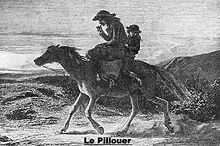Colportage

Colportage is the distribution of publications, books, and religious tracts by carriers called "colporteurs". The term does not necessarily refer to religious book peddling.
Etymology
| Look up colportage or colporter in Wiktionary, the free dictionary. |
The term is an alteration of French comporter, "to peddle", as a portmanteau or pun with the word col (Latin collum, "neck"), with the resulting meaning "to carry on one's neck". Porter is from Latin portare, "to carry".
History
The American Tract Society, an evangelical organization established in 1825 to distribute Christian literature, reported in its 24th annual report in 1849 "Colportage including 106 students from 23 different colleges or seminaries for their vacations.... [T]he colporters have visited 341,071 families...[and] sold 377,258 books."
In Christ in the Camp: or, Religion in Lee's Army (1887), Dr. John William Jones refers to the chaplains carrying bibles and tracts during the American Civil War as colporteurs. In addition to public preaching, distributing literature was a large part of the work of the Confederate Army of Northern Virginia. The American Bible Society and the American Tract Society were among the largest organizations involved in colportage in the United States.
D. L. Moody founded the "Bible Institute Colportage Association" in 1894 to distribute tracts and books. Now known as Moody Publishers, they continue to publish religious materials with proceeds supporting the Moody Bible Institute.[1]
The Seventh-day Adventist Church calls their book distributors "literature evangelists", but until about 1980, the term "colporteur" was used to describe SDA literature evangelists.
Jehovah's Witnesses who were active in the full-time ministry were called colporteurs until 1931. Today, those participating in the full-time ministry are called "pioneers".
References
- ↑ "About Moody Collective". Retrieved January 21, 2015.